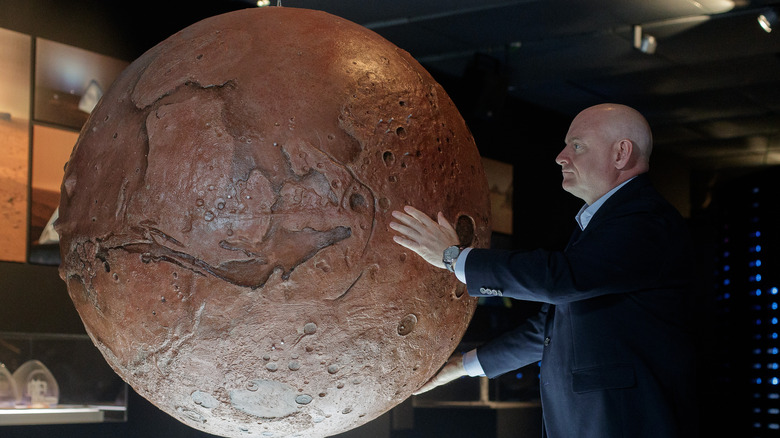Why Do Astronauts Grow Taller In Space?
Space does strange things to the human body. Just ask Scott Kelly, a former NASA astronaut who spent 340 days circling the Earth in a rocket. All kinds of things impacted him, including the microgravity, radiation exposure, and space food. Scott discovered that his face became puffy because the liquid in his body distributed more evenly. In fact, the fluid, which moved from his legs to head would fit into a two liter soda bottle (as per Business Insider).
Scott's experience in space was detailed in NASA's Twins Study, where 10 groups of researchers looked at what changes the human body — physiological, molecular, and cognitive — encountered when in space. Data was collected from Scott's yearlong mission and his twin brother, retired astronaut Mark Kelly, who was on Earth during his sibling's time in space. Mark provided a baseline for researchers who could compare his measurements and reactions with his brother's.
While the extreme environment altered Scott's body, the study concluded that humans who engage in similar space travel can remain healthy, reported Science. The Twins Study demonstrated the resilience and robustness of how a human body can adapt to a multitude of changes induced by a spaceflight environment, per NASA in a press release. However, more study is needed to determine any long-term consequences of space travel, especially since long missions are rare.
Visiting space can also make you taller — about 3% more. That means that a 6-foot-tall astronaut might add 2 inches to their frame, according to Scientific American.
Microgravity impacts the human body
The extra height is the benefit of living in a microgravity environment. Without Earth's gravity, the spine's vertebra expands and elongates so the astronauts (literally) reach new heights, said Scientific American. But the effects are short-lived. After a few months back on Earth, astronauts return to their usual size.
This is not all new information. Scientists have studied how human anatomy changes when exposed to microgravity, and hope to learn how troublesome some of the changes are to muscles, bones, eyes, and the cardiovascular system, according to Space.com. Especially problematic are eye alterations, with astronauts reporting permanent vision changes after returning to Earth. The increased radiation can result in cataracts, reported CNBC.
Researchers want to understand things like why the spine reacts the way it does when in microgravity, and use the information to help astronauts return to Earth (and gravity) more effectively (via another Space.com article).
When Scott came home after living almost a year on the International Space Station, he was 2 inches taller than his twin, according to Discover Magazine. But the height boost proved temporary, so the brothers are the same size again.

